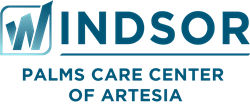[ad_1]

Windsor Palms Care Center of Artesia
“The program focuses on strengthening and sustaining effective behavioral health practices and achieving better outcomes for residents who have mental illness and/or moderate behavioral or emotional disturbances.”
ARTESIA, Calif. (PRWEB)
September 15, 2022
Windsor Palms Care Center of Artesia, a 296-bed skilled nursing and rehabilitation center, announced today that it has relaunched an updated and improved behavioral rehabilitation program at their Artesia, California care center.
Windsor’s behavioral rehabilitation program aims to promote psychological, cognitive, and emotional health among residents with mental health and behavioral issues. It is a collaborative effort of multiple departments consisting of numerous groups, activities, psychological services, psychiatric services, and nursing services.
“Windsor Palms Care Center of Artesia is proud to offer a behavioral rehabilitation program,” says Wayne Fortin, MBA, MHA, Administrator at Windsor Palms. “The program focuses on strengthening and sustaining effective behavioral health practices and achieving better outcomes for residents who have mental illness and/or moderate behavioral or emotional disturbances. Our program ensures accessibility of evidence-based training and technical assistance focused on mental health disorder identification, treatment, and recovery support services.”
Initially launched in 2017, the program was designed to meet four key patient goals:
1. Reduction in physical aggression;
2. Placement in a lower level of care;
3. More adaptive coping skills; and
4. Better psychological, cognitive, and emotional wellbeing.
It was recently expanded to include a wider range of groups, activities, and services. The program currently includes:
- ADL training
- Anger management
- Art expressions
- Budgeting
- Cultural awareness
- Current events
- Discuss and recall
- Distress tolerance
- Fun with rehab
- Group therapy
- Leisure skills
- Medication awareness
- Mental health awareness
- Nature walks
- Relapse prevention
- Relaxation and mindfulness
- Resident concerns
- Sexual awareness
Future programs, activities and groups will include:
- 12 steps
- Book club
- Conflict resolution
- Drug education
- Journaling group
- Motivation
- Music group
- Reminiscing/storytelling
- Sensory group
- Social Skills
- Trivia
There are currently 16 residents in the program, with the plan to increase participation to 30 in the near future.
Share article on social media or email:
[ad_2]

